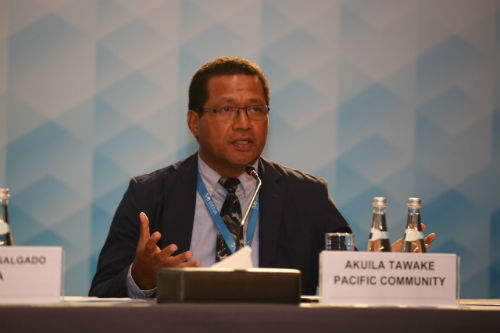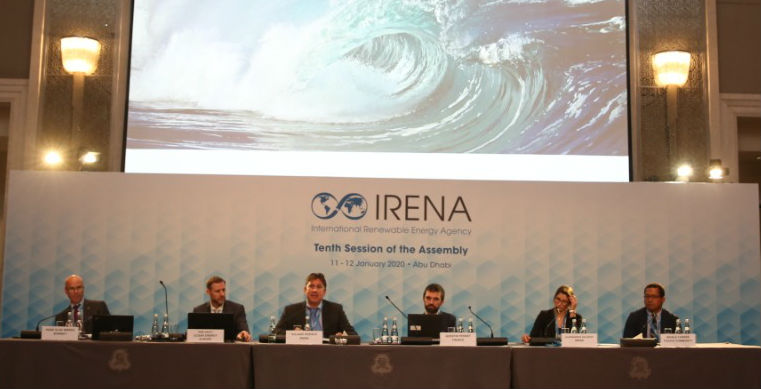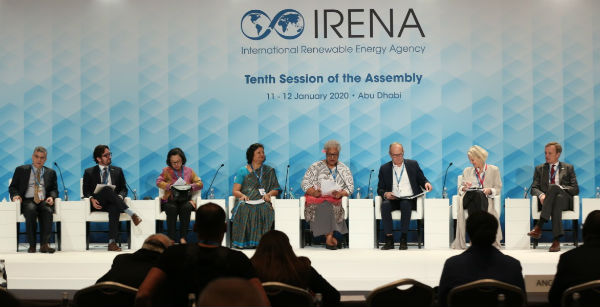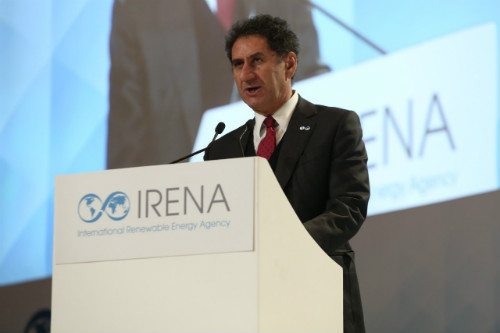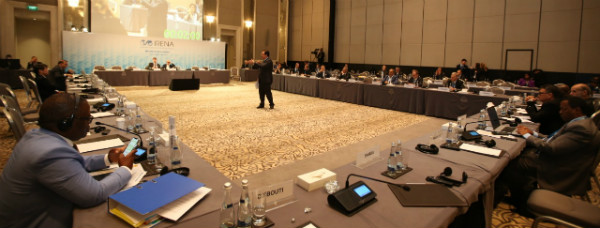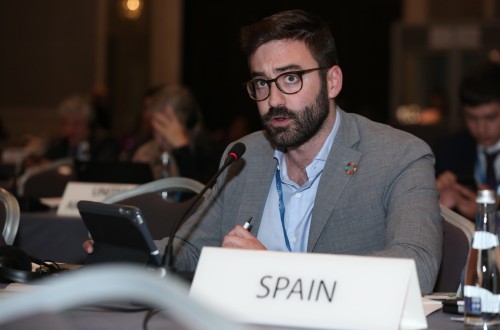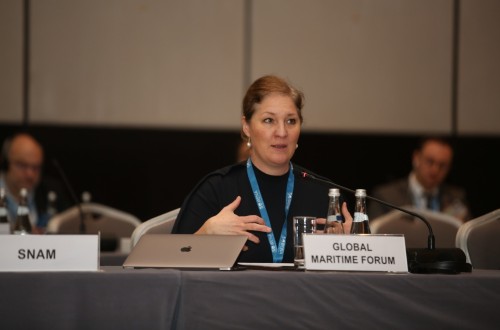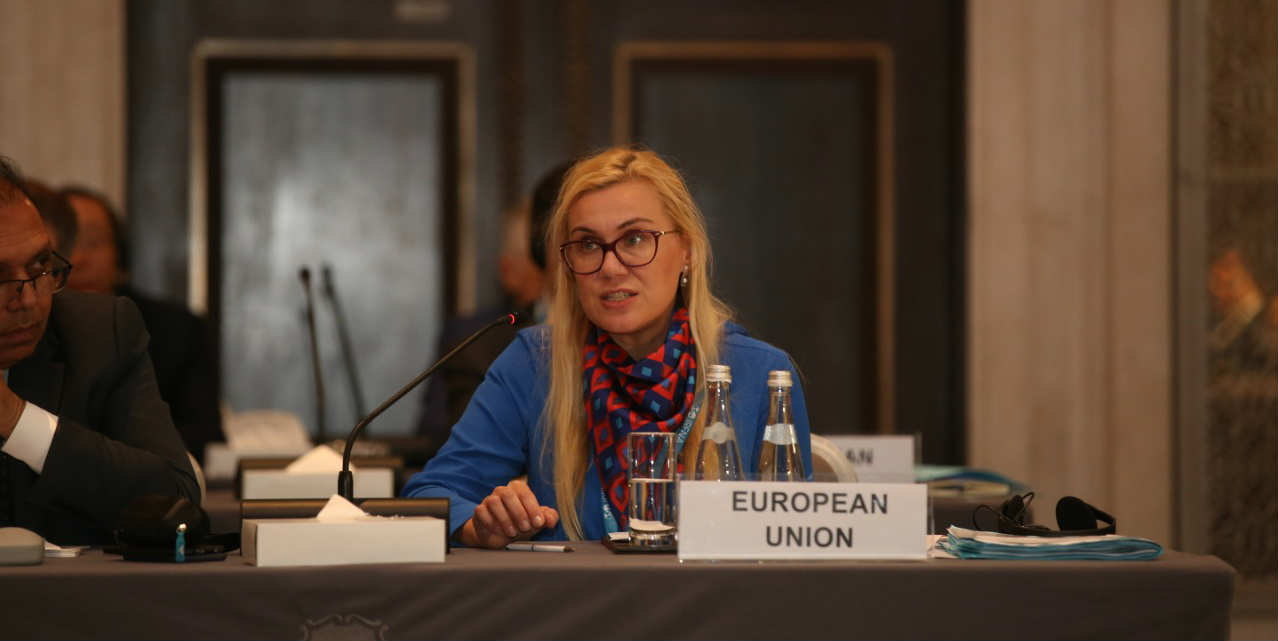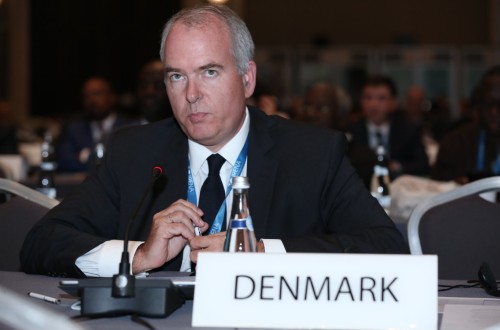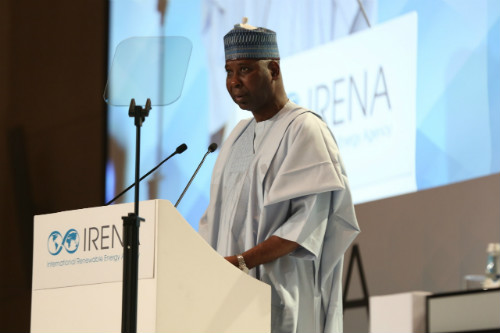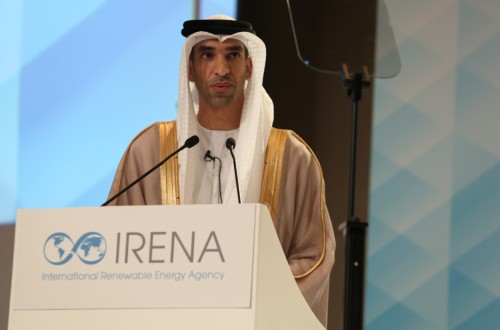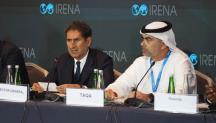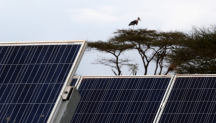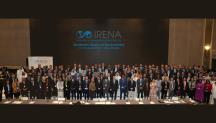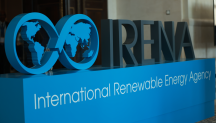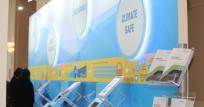
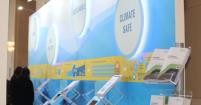
IRENA Tenth Assembly Live
Newsletter
Over 1,500 delegates from more than 160 governments, the private sector and civil society will gather in Abu Dhabi to discuss key issues in the global energy transition and chart the way forward for the Agency against a backdrop of remarkable progress on deployment.
This live blog provides a rolling coverage of the Tenth Assembly Events as they happen.
At the close of the Tenth Assembly, IRENA called to double the share of renewables in the upcoming ‘Decade of Action’ to achieve energy transition objectives. 10 Years: Progress to Action, published today, charts recent global advances and outlines the measures still needed to scale up renewables.
The Agency’s data shows that annual renewable energy investment needs to double from around USD 330 billion today, to close to USD 750 billion to deploy renewable energy at the speed required. Much of the needed investment can be met by redirecting planned fossil fuel investment. Close to USD 10 trillion of non-renewables related energy investments are planned to 2030, risking stranded assets and increasing the likelihood of exceeding the world’s 1.5 degree carbon budget this decade.
Today, IRENA has signed a number of MoUs with partners, including United Nations Economic and Social Commission for Asia and the Pacific (UNESCAP), European bank for Reconstruction and Development (EBRD), Casa Depositi e Prestiti (CDP), International Energy Forum (IEF) and theEast African Centre of Excellence for Renewable Energy and Efficiency (EACREEE).
EACREEE promised to work closely with IRENA under their MoU to scale up renewables in the East African region, in particular the extension of the clean energy corridor and the certification of the solar PV technicians.
During his remarks, the Secretary General of IEF, said "Now more than ever, collaboration and dialogue are needed to advance global energy sustainability and the transformation towards a low-carbon energy future. This MoU is a testiament to the commitment of both the International Energy Forum and IRENA to achieving that end.
Wisdom Ahiataku-Togobo, Ministry of Energy, Ghana noted the importance of hydropower for Africa in general. He continued: "Hydropower coupled with solar and wind guarantees great stability. During the day we reserve what is in the basis and we release it at night."
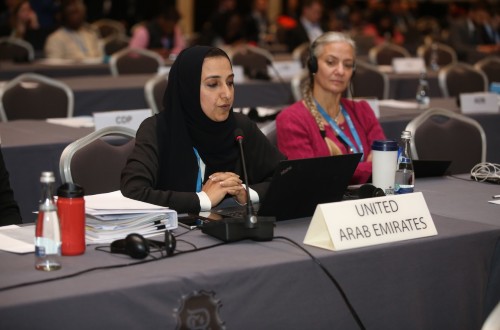
Following the panel discussion, Members take the floor. The UAE Permanent Representative to IRENA, Excellency Nawal Al-Hosany Nawal, United Arab Emirates, announces the ptromising hydropower project planned for 2024 in Hatta as a part of a larger sustainable development strategy of the country, and the strategy to develop the Hatta region.
In the panel discussion summary, Pravin Karki said "Hydropower won't come over time, we need to be prepared for the future. And educate, educate, educate - we need specialised engineers and hydro is a complex subjects." Following up, Frédéric Hofmann, Director of Development, EDF Hydro stated that the performance of hydro can now be monitored and issues can be anticipated, which further improves the value of hydro and reduce the costs of refurnishing.
Eddie Rich concluded the panel discussion saying that twenty-first century hydropower will be "more modern, more sustainable and will overall be more."
"We have the potential, but we lack the resource assessment in the Pacific Islands countries. This is a gap IRENA may fill," said Akula Tawake, the Pacific Community at the Ocean session. Another gap which needs addressing is the lack of policy framework for ocean energy. Mr Tawake brought up the energy, water and food security nexus - all three are very much linked to one another, meaning that the actions in any one particular area often can have effects in one or both other areas. These three sectors are necessary for the poverty reduction and achieving sustainable development goals.
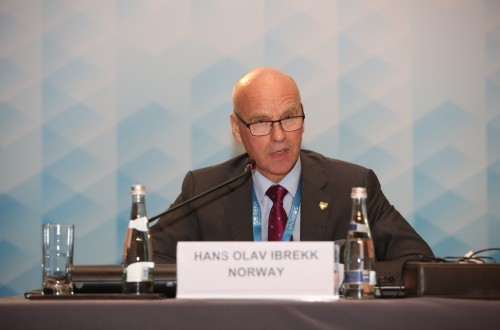
Hans Olav-Ibrekk, Norway noted a huge potential of ocean energy and brought up a few examples from his country. Off-shore floating wind has been growing strong in Norway since 2009, when the first turbines were put in place. The current ongoing project for offshore wind, 88-MW floating offshore wind farm will supply electricity to platforms on two oil fields and will be the first of its kind and the biggest floating wind power project in the world.
Quentin Perret, France opened the discussion saying 'Ocean energy is not expected to play major part, besides offshore wind energy, obviously. (...) There are several other renewable energy technologies that are commercially competitive. On the other hand France has been a pioneer in ocean energy, with the first tidal wave energy plant built over 50 years ago," he added.
"Next to wind and solar, ocean energy may be needed to improve flexibility of the grid."
Remi Gruet, Ocean Energy Europe, is showcasing current development of ocean energy and speaks about the innovative concepts which are currently emerging in ocean technology. Europe, US, China, Korea, Chile all have interest, as do many islands in the Caribbean which recognise the high potential and are actively interested in ocean energy, mentioned Mr Gruet.
Global Geothermal Alliance: Enabling Frameworks for Accelerated Development is in progress.The Opening Speech was delivered by the former President of Iceland, Ólafur Ragnar Grímsson who noted:
"It’s worth remembering that the GGA was one of the products of COP21 discussions. With the growing emphasis onclimate change today, we should not forget that global geothermal transformation is a core element of climate action."
Mr. Roland Roesch, Deputy Director IITC opened the session. He noted that the session will help to establish the direction on how IRENA can support countries sin the development of ocean energy technologies and priorities in the next 5 years. Ocean energy is expected to grow substantially, reaching over 100 GW installed capacity by 2050 under IRENA scenario, adding to the esitmated 1000GW from offshore wind. The potential of ocean energy technologies is huge, Mr Roesh underlined.
"Climate Investment Platform has a strong potential to unlock finance towards energy transition and help de-risking investment. Implementation of Investment Forums by IRENA will help to achieve higher impact on the ground," Deputy Prime Minister of Samoan, Fiame Naomi Mata'Afa concluded.
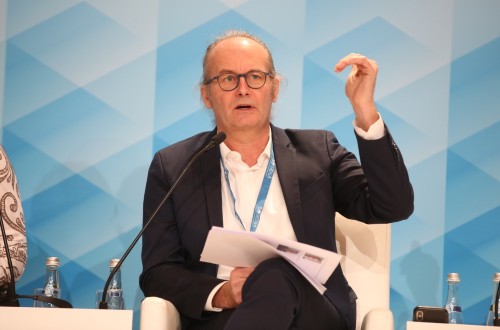
At the session closing, Claude Turmes, Minister for Energy, Luxembourg noted the countries' need for innovation and new ideas on increasing investment, also on a local level. Closing the energy gap is of huge importance, tackling poverty is tied with providing access to electricity for all. Stopping coal subsidies and redirecting this investment on a public level is also key, he underlined. "2020 is a year of ambition - all governments need to look deeply and see how to raise the ambition. (...) We are of one planet, and need to solve the climate issue together."
"Just transition, inclusion to make sure no one is left behind and energy security are very important, and mechanisms and funds to help those in transition from being coal-dependent to renewables need to be there," said Mrs. Ditte Juul-Jørgensen of the EU.
10th assembly Vice-President, Samoan Deputy Prime Minister Fiame Naomi Mata'Afa moderating the session, invited the panelists to provide their summary remarks. Increasing investment in renewables is a global issue and we need innovative solutions to bring about a major, leapfrog change in the current trajectory. The organisations such as IRENA, SE4ALL and UNDP should take the role of innovating and providing new scenarios for accelerating investment in renewables, the panelists recommended.
Urgency is there, the next decade is a decade of action.
Benoit Revaz, Switzerland underlined that the country plans to reduce its emissions to net zero by 2050. The country has already begun its hard work in enabling investment, embarking on recomputing its energy scenarios in line its zero emissions target. The country also recognises that policy frameworks need be legally set in order to provide enabling environment for investors.
"Political goals need to be underpinned by solid data modeling & scenarios."
The Director Office of Energy Transformation, USA, Griffin Thompson presented the country's bottom up approach to renewable energy targets - local governments have flexibility to develop their strategies to attract investment. The country is happy to share its experience and lessons learnt. Localisation of innovation is crucial for the country. On international scale, IRENA plays an important role in facilitating countries learning between countries and the Agency's progress into facilitating local project investment in the future globally is welcome.
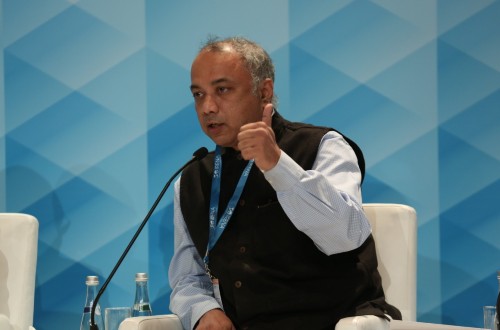
Mr. Harish Hande, Founder and CEO, SELCO Foundation takes the floor"
"How do we, as big organisations, create an ecosystem for local and rural parts to give them access to capital? 3 billion people need access in the next years. We need to bridge this gap to localise the thought process and give the power to the people that it needs to go to"
Mr Mourad Wahba the Deputy Administrator of UNDP addresses the delegates, mentionin gthe recent IRENA-UNDP partnership for the Climate Promise initiative. It is a perfect merge of IRENA's vast expert knowledge on renewables with UNDP's development community reach. The Climate Promise aims to support 100 countries to accelerate the enhancement of national climate pledges by 2020, building on its climate action portfolio in over 140 countries. Mr Wahba has also highlighted the Climate Investment Platform, which is an inclusive partnership and will allow to identity promising renewable projects, investment partners and help matching them within the sub-regional clusters.
"IRENA's message has been It's Possible - in UNDP we firmly believe IRENA's dream on sustainable energy for all is possible."
In his contribution, Pablo Vieira, at NDC Partnership summed up saying:
"The energy transition of countries will define our success in implementing Paris Agreement. 2020 NDCs update gives a great opportunity to countries to show their commitment."
Mrs. Ditte Juul-Jørgensen, Director General for Energy of the European Commission:
"For us 2030 is only an intermediate step towards climate neutrality. To this regard, we recently approved the Green Deal, setting out a path towards a more sustainable future. The Green Deal is an international agenda and the Union intends to enhance cooperation with new partners. The Deal will represent a total of 25% of the total spending of the European Union, destined to fight climate change."
The Plenary session on Renewables Investment in the context of National Energy Planning and Implementation continues with panelists discussing the opportunities and barriers to reaching SDGs and energy targets by 2030. The panel opened with an intervention from Armida Salsiah Alisjahbana at , the Executive Secretary of UNESCAP, focusing on Southeast Asia. Ms Alisjahbana noted that lack of an appropraite policy is the biggest issue in the region, preventing the region to reach its 2030 goals.
In his opening remarks, IRENA Director-General, Francesco la Camera called for an increase in energy efficiency and the speed of deployment of renewables. He followed up presenting remarkable progress in renewables to date.
"Renewables are often underestimated in NDCs. Not all domestic policies are aligned with NDCs. The next round of NDCs represent the opportunity for countries to renew their commitments."
Access to finance and de-risking investment is crucial in accelerating renewable energy deployment. In this content, IRENA has partnered with the United Nations Development Programme (UNDP) and Sustainable Energy for All (SE4All), in co-operation with the Green Climate Fund (GCF) and launched the Climate Investment Platform. IRENA has taken an enabling role in project facilitation and is planning to convene a series of matchmaking events, Investment Forums,this year, organised by sub-regional clusters, and provide relevant project development support . within the clusters.
IRENA invites multilateral, bilateral and local financial institutions, other development organisations and other institutions that are prepared to provide financial resources, technical assistance and/or support the realisation of projects, along with private companies and private investors, to become partners of the Climate Investment Platform (CIP). Within the framework of the CIP, interested organisations can register under relevant sub-regional operational cluster(s) and propose modalities for technical assistance and/or project support that they can provide in response to requests received through the Platform. Partners will be informed of all CIP events and invited to Investment Forums and other related activities.
His Excellency Mohammed Saif Al Suwaidi, Director General of the Abu Dhabi Fund for Development announced a record USD105 million of funding for eight renewable energy projects in developing countries in the seventh cycle of the IRENA/ADFD Project Facility.
Winners of the 7th funding cycle of IRENA/ADFD Project Facility took the floor to present their winning projects.
The Chair of the IRENA/ADFD has reported the outcomes of two-year cycle projects. Advances in renewable energy projects countries as Seychelles,Maldives,Cuba among the others, and have been showcased to participants and has welcome the future participation of new partners.
Shri Anand Kumar, India stated "we must de-risk and make the investment safe."
Damilola Ogunbiyi, CEO, SEforAll outlines how energy access in crucial to all sectors and the delivery of SDGs.
"Speed is really essential, we have 10 years to go and must take it seriously to provide universal energy access by 2030."
In its presentation, Nepal's project shows great commitment to the Nepali people and the US$10 million ADFD fund will bring a wide array of benefit to the community. More than 500 households are using biogas for cooking, contributing to the improvement of general health and producing high-quality fertilizers, as well as reducing carbon emissions. The country is deploying a series of programmes in cooperation with international organisations to support and expand biogas pipeline facilities.
The Luxembourg Minister of Energy, H.E. Claude Turmes delivers the final remarks at the Hydrogen Roundtable. It is important not to tell citizens that everything will be hydrogen as this does not lead to economic solutions, Renewable-based hydrogen needs policy maker's support - clear labeling is required to identify green hydrogen produced through electrolysis.
"If the car industry is able to bring us from diesel to electric, it will mean a huge pressure on electricity system - the challenge is in efficiency and storage."
Ongoing interventions from Members at the Green Hydrogen Ministerial Roundtable focus around huge opportunities hydrogen brings for decarbonisation of heavy industry, hard to decarboonise sectors, such as transport, shipping and steel industry. It is clear that hydrogen will play a very active role in the energy transformation globally in the near future.
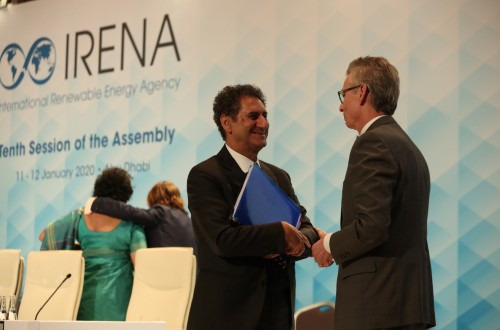
In closing, IRENA Director General Francesco La Camera expressed his gratitude for the Agency’s participation and attendance. “I am trying, if ever possible, to give a clear message that this organisation is in your hands. We are here to serve”
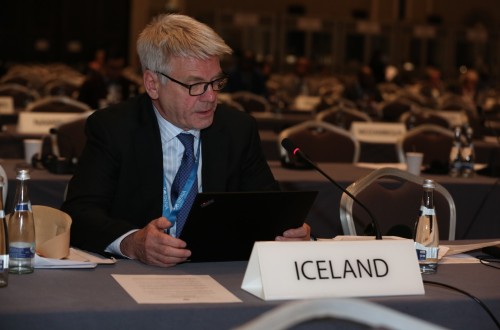
Iceland highlighted the extremely important role that geothermal energy plays. More than 90% of electricity in Iceland is a result of the direct use of geothermal and in addition the resource is being used in many industries including agriculture. Iceland described geothermal as a multifaceted resource that can be used in various applications in addition to power generation.
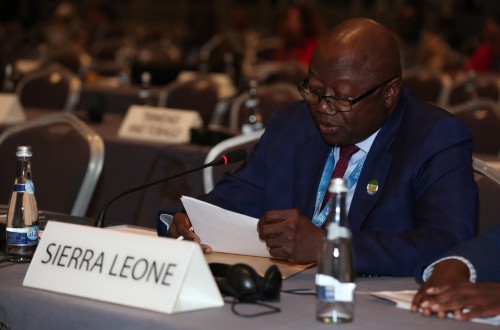
"In 10 years of IRENA, the General Assembly has always represented the global platform to examine new trends and discuss future challenges of renewable energy. "
Sierra Leone is glad to share its plans of expanding renewable energy shares from the current 15% to 80% in 2030, by adopting a set of measures such as tax-free solutions to attract private sector investments.
As the country interventions session approaches its conclusion, Benin acknowledged the challenges ahead in the optimal deployment of renewable energy. However the country is hopeful, being blessed with plentiful renewable energy resources: including high rates of sunlight, intense winds peed and huge potential for biomass.
The government is promoting the country's energy transformation through private sector incentives and a national energy master plan.
Private sector contribution to the hydrogen discussion from Manuel Kuehn, Siemens Middle East senior Vice-President for strategy and business development, overseeing the joint green hydrogen pilot project in Dubai at Siemens, UAE:
“How do we get from talks, to economically viable projects. We need to get confirmed project pipelines so that we get development underway and get costs down”.
From Spain's intervention: "Recent reports remind us that we need to increase our objectives to combat climate change. We now, in Europe, have an objective of climate neutrality by 2050. The reduction in cost the renewable energy offers a future that benefits the both the economy and the environment. We must start planning and working from now, otherwise there will be stranded assets and other avoidable issues"
Speaking at the hydrogen session, Ms. Johannah Christensen, Managing Director, Global Maritime Forum mentioned the shipping industry must halve emissions by 2050. "This doesn't happen with energy efficiency. New fuels are required, and that is where green hydrogen comes in".
Asked about the role of hydrogen as a storage solution, Engie says in places such as California and in the South of Australia where there are increasingly high shares of renewables, the more renewables you have the more you need storage. Generally for countries with above 50 per cent of energy from renewables storage solutions become key. The good thing about hydrogen is that is can be used to decarbonise other sectors such as transportation.
Nepal has been working with IRENA to identify potential areas for action to develop the ecosystem for deploying renewable energy solutions. In its interventions, Nepal's representative drew attention to the impact that climate change can have on technologies such as hydropower. In this regard, the country welcomes tomorrow's discussions on hydropower at IRENA's 10th Assembly.
The European Union Commissioner for Energy, Ms Kadri Simson says "hydrogen is an important piece of the puzzle in achieving transition to the low-carbon economy".
"2020 is the year of ambition. This year we doubled our contribution to the Green Climate Fund and we established the Climate Investment Platform which we hope will become the dating side of finance."
The representative of Denmark has acknowledged IRENA's work over the years and commended the Agency's latest initiatives. The country, known for its ambitious climate action plans, has reinforced its readiness to support projects around the world to scale up energy transformation.
Korea has joined Denmark's voice in highlighting 2020 as a crucial year for the global energy transformation to achieve a decarbonised society. Realising the commitments made with the Paris Agreement is imperative to tackle climate change and achieve Sustainable Development Goals.
In his keynote speech, Mr. Fatih Birol, Executive Director, International Energy Agency providing background on the remarkable progress of renewables, including onshore and offshore wind and hydrogen, Mr Birol notes that "Solar is a star of electricity generation. 40% of all new power in the world came form solar in 2019".
Next, he progresses to outline challenges facing accelerated uptake of renewables, with the main challenge being flexibility of the power system. The need for flexibility is increasing and today's market design may not bring sufficient investment to deliver necessary networks, demand-side and energy storage, including hydrogen.
An unprecedented momentum for hydrogen is now. Hydrogen can help to overcome many challenges, enhancing storage options, play vital role in decarbonising sectors hard to decarbonise and enhance energy security by diversifying the fuel mix and providing flexibility to balance grids. But "is hydrogen expensive?"
IEA Executive Director Fatih Birol opens the IRENA Session on Hydrogen by thanking IRENA Director-General Francesco La Camera for his great leadership of the Agency and reinforces the strengthening relationship between IRENA and the IEA saying the two are benefiting from each other's work.
Fatih Birol says the growth in global emissions is not just a story about countries. It is also one of technologies, highlighting that SUV car sales are responsible for some of the world's rising emissions. “One SUV emits on average 25 per cent more emissions than a traditional combustion engine. And their sales are growing. In 2010 18 per cent of all the cars in the world sold were SUVs. Last year, 42 percent of every car sold was an SUV."
The Ministerial Roundtable on Green Hydrogen kicks off with the welcome remarks of the IRENA Director-General.
"Interest in green hydrogen is there. Many green hydrogen projects are under development, to scale yo use of hydrogen in industry, including transport."
Continuing, Mr La Camera mentioned IRENA recently released Hydrogen from Renewable Power, focusing on the production process and opportunities that hydrogen brings for decarbonisation and Hydrogen: Renewable energy perspective which examines the potential of hydrogen fuel for hard-to-decarbonise energy uses, including aviation, shipping and other. But the decarbonisation impact depends on how hydrogen is produced.
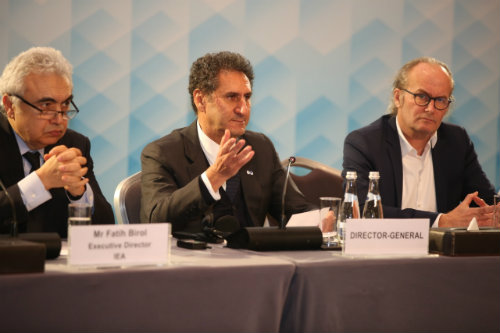
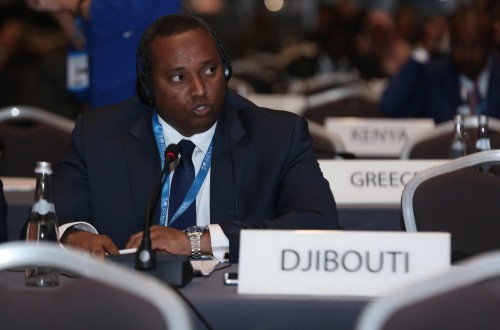
As IRENA's interventions go on at the Plenary hall, Djibouti has stated its commitment to become fully powered by renewable energy by 2024. Solar, wind and geothermal will be at the core of the country's energy transformation, which will bring benefit to the national economy.
"This is an excellent opportunity where decision makers will work together to advance the transformation."
Seychelles recognises that IRENA will have a bigger role to play to lead the world to cleaner energy. Morevover, through support of IRENA and ADFD the country is on track to meeting our 2020 renewable energy target and beyond.
"We support the vision of one sun, one world, one grid. Where rich countries can provide power to resource-deficit countries." India's renewable energy growth has been facilitated by the private sector with investments over $400 billion in the renewable energy industry and holds great ambition to fight climate change together.
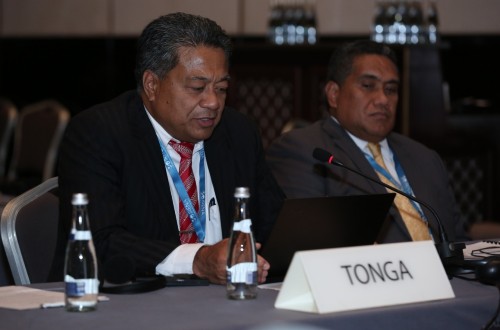
Tonga will reach its 50% of renewable energy target by the end of the year and the country is committed to 100% renewables by 2035. Tonga emphasized that answering energy access needs to be accessible to all, affordable and with sustainable use of assets.
The Members Interventions continue this afternoon. Aziz Rabbah, MInister of Energy, Mines and Environment, Morocco takes the floor. He underlines Morocco's efforts in expanding renewable energy in the country, including various country initiatives and studies on hydrogen and other upcoming technologies. The country has early on realised the importance of having a practical plan to face climate challenge and welcomes IRENA's help and development of Agency's programme in support of innovation in technology, project facilitation and policy in the area of renewable energy.
During their intervention, the Maldives highlighted the country's insignificant contribution to climate change, but noticed "yet we are taking very bold steps."
The Maldives Environmental Minister, Hussain Rasheed Hassan, thanked IRENA and ADFD for supporting the first project of waste-to-energy in the Maldives. "We appreciate IRENA’s work to bring decision makers form the private and public sector for example the new webinar and seminar series. We are particularly pleased to see the growth of the Agency’s members."
He underlined that the country is deeply transforming its energy system by phasing our nuclear by 2022 and expanding renewable energy ambitiously.
Honorable Fortune Chasi, Minister of Energy of Zimbabwe, started by mentioning the usefulness of IRENA publications on long-term energy planning and flexibility of energy system, saying the country sources its knowledge from IRENA products. "As a global voice for renewable energy, IRENA can take advantage of regional ministerial meetings before cascading action at the country level," he concluded.
Excellency HE Dr Khaled Al Sultan, president of the King Abdullah City for Atomic & Renewable Energy, Saudi Arabia highlighted the significance of renewable energy to the Kingdom's national endeavors. He expressed the private private sector’s role in accelerating deployment in the Kingdom and the country’s efforts in incorporating the field into its educational system.
Italy's intervention focused on the falling costs of renewables and growing capacity in the country, underlining Italy commended the recently signed Green Deal of the European Union. The country is elaborating a strategy to reach emission free economy by 2050. Renewables gross final energy consumption in Italy is already at 18% at the moment, leading the energy transition. In addition, renewable energies provide an answer to closing access gap in Africa.
The European Union Commissioner for Energy, Ms Kadri Simson, underlined that the "climate challenge is not just a European challenge, it is a global challenge that needs a global response." She added that that is why the EU values the role that IRENA plays in facilitating global cooperation. Renewable energy is already a crucial part of the energy system, and the EU is on track to reach its renewable energy target of 20% by 2020, she concluded.
Luxembourg intervention, delivered by Excellency Claude Turmes, started with bringing up the crisis in Australia and recent wild fires on a yet unseen scale.
"We are approaching a tipping point and we have now entered a climate crisis age. 2020 will have to be a year of ambition. In December 2020, all countries will need to step up and raised their ambitions".
Luxembourg has raised its ambition from 40% to 55% and the EU has now declared zero emissions by 2020, he added and concluded calling for international cooperation.
Today's Members Interventions started with Japan's input, delivered by the State Minister of Foreign Affairs, Kenji Wakamiya, raising the issue of recycling renewable energy technologies in the future.
Mr La Camera also mentioned the recent launch of the Capacity Building Programme for Young Professionals from LDC and SIDS. The programme provides an opportunity for young professionals from LDCs and SIDS, with the agreement and support of their governments (or institutions), to serve at IRENA Headquarters in Abu Dhabi, United Arab Emirates or at its office in Bonn, Germany, for a period of one to two years. The programme aims to build capacity for addressing renewable energy issues in SIDS and LDCs and to provide experience in an intergovernmental organisation setting. The programme funding has been obtained through selected member countries donations.
IRENA work needs to continue in the context of mid-term strategy. Mr La Camera proceeded underlining IRENA's regional work, describing the current engagement and underlining the new action plan for regional implementation. 14 sub-regional clusters will enable IRENA to move towards working on the ground in an efficient and coordinated manner. Clustering will be important for knowledge sharing, scaling up regional investment and project facilitation.
IRENA will carry out work under 14 clusters as a contribution to Climate Investment Platform. The Director-General called for investors, global and local financial institutions to partner with IRENA to help enabling scaling up investment in bankable renewable energy projects.
Francesco la Camera, IRENA Direct-General, is currently delivering the Annual Report on the Implementation of the Work Programme and Budget 2018-19. He begun with describing successful renewable energy progress to date against what has to be done to accelerate the energy transformation.
"Energy transformation is unstoppable. But it is not happening fast enough."
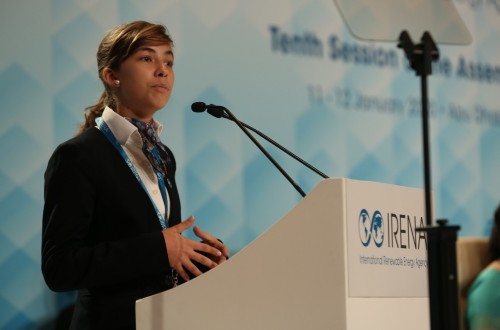
The Youth representative has presented the outcome of the first IRENA Youth Forum, which marked a historical milestone for the Agency and a step forward towards the acceleration of the global energy transformation.
The Youth Forum has given space to youth participants to express their perspective and their ideas on the deployment of renewable energy worldwide with the international community and governments representative and renewable energy experts.
During the forum, challenges and solutions about innovation, climate change and socio-economic benefits were discussed and key takeaways were identified.
"We are here for the future generations. Stay positive and our ambitious will become reality."
Bruce Douglas, Solar Power Europe reported back on the Public-Private session. He opened his speech commemorating a former deceased member of the Coalition for Action, Steve Sawyer, the co-founder of Greenpeace.
He underlined that the members of the Coalition are happy to see more governments looking to implement high-shares of renewables in their energy systems. However, he added, "the Coalition remains concerned that the NDCs fall short of what is needed to achieve climate objectives, in particular in wealthy, developed nations. Investment levels are still high below what is needed."
He summarised three steps to help increase shares of renewables in energy systems: necessary transformation of infrastructure of energy systems and policies; scaling up investment to close Africa's energy gap will require the de-risking of investment and adequate policy frameworks; early involvement of local communities is key to ensure renewable energy project maximise benefits for communities.
"The coming decade must be the decade of scaling renewable energy," he concluded.
Geopolitics of Energy Transformation session report is being delivered by Ms. Fatima Al-Foora Al Shamsi, Assistant Undersecretary for Electricity and Future Energy, Ministry of Energy and Industry, United Arab Emirates. Session participants highlighted the crucial role of international cooperation in ensuring smooth energy transition and underlined the importance of just transition for all. She added that renewables can reduce global competition over natural resources and improve water and food security.
Accelerated deployment of renewables and increased rate of electrification will enhance regional cooperation in the future. The session participants recognised the importance of knowledge sharing and listening to successful example of regional cooperation from all countries. In this context, the session participants called for the Agency to identify best practices in regional cooperation and share this knowledge with the Member states.
Deputy Prime Minister of Mauritius, Excellency Ivan Leslie Collendavelloo reported back to the assembly on the SIDS session, which took place during the Pre-Assembly Day.
“SIDS remain on the forefront of climate action. Islands are increasing ambition in NDCs to take advantage of the synergies in climate mitigation and socio-economic benefits. It is clear that now is the time to act.”
Tijjani Muhammad-Bande of Nigeria, the current President of the United Nations General Assembly for the 74th session started in September 2019. "United Nations recognises IRENA's role in realisation of SDG7 - Energy", he stated. Continuing to underline the importance of accelerating energy transformation, he encouraged shift in investment from fossil fuels towards renewables, decarbonisation of transport and other sectors. "Renewable energy sector created jobs employing over 11 million people in 2019 and provides off-grid solutions, having helped to bring the number of people with no access to electricity to under 1 billion", the President of the UN General Assembly added.
H.E. Dr. Thani Ahmed Al Zeyoudi, Minister, Ministry of Climate Change and Environment of the United Arab Emirate gives an opening statement from IRENA host country, cordially welcoming IRENA Members and other Assembly delegates in Abu Dhabi. "United Arab Emirates is proud help forward IRENA goals", he says and continues to summarise the UAE success in growing implementation of renewable energy solutions and fostering innovation. He concludes inviting all participants to attend the World Future Energy Summit and the Abu Dhabi Sustainability Week.
Uganda is elected as a President of the IRENA Tenth Assembly. The country is represented by Uganda Deputy Prime Minister, Ali Kirunda Kivejinja.
The President of IRENA 9th Assembly, China, represented by Liu Baohua, officially opens the 10th Assembly session summarizing progress and achievements of renewables throughout 2019 and beyond. He states:
"IRENA is without a doubt one of the leaders in renewable energy".
The next step is a designation of the 10th Assembly President.
In Belarus, more than 50% of energy resources that provide heating have been shifted from natural gas to biogas, showing the great commitment to the country to the clean energy targets and a clean energy transition. In parallel, Belarus also intends to further tap its other renewable energy resources and hence, the country is working to develop wind power and hydropower using the most advanced technologies.
Belarus expressed that it is looking forward to the Renewables Readiness Assessment (RRA) of Belarus in collaboration with IRENA to be launched in 2021.
